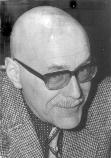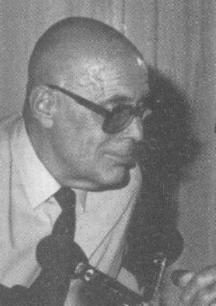Hans Albert - critical rationalist
 The importance of Hans Albert's work is in no way
limited to social sciences. In philosophy too,
Albert has accomplished a lot. Above all, there should be mentioned that he made Popper's critical rationalism very concise and
applicable to many fields of human practice. He even turned critical rationalism in a way of
life. He gave evidence to his thesis that there is no field of
human activities where one had better not be critical. Thus he applied critical
rationalism to economics, politics, law and religion. In his
view, the attitude of criticism is one of the oldest European
traditions, worth to get more attention in comparison with other
less critical traditions.
The importance of Hans Albert's work is in no way
limited to social sciences. In philosophy too,
Albert has accomplished a lot. Above all, there should be mentioned that he made Popper's critical rationalism very concise and
applicable to many fields of human practice. He even turned critical rationalism in a way of
life. He gave evidence to his thesis that there is no field of
human activities where one had better not be critical. Thus he applied critical
rationalism to economics, politics, law and religion. In his
view, the attitude of criticism is one of the oldest European
traditions, worth to get more attention in comparison with other
less critical traditions.
Before many of his great books were published Hans Albert was already
known to a broader audience for his brilliant contributions to the
positivism debate answering his opponents of the so called
"Frankfurter Schule" (school of Adorno and
Horkheimer). At least from there on, the up-mixing of critical
rationalism and positivism should have been impossible. Under the
force of arguments the acclaimed special position of some strains of
Sociology against a scientific coined reason finally should have
been given up - if there had not been not ideological obstacles: the "immunity against criticism".
This is one of
the many diagnostic formulae Hans Albert created for and applied to philosophical diseases
(which often spread out to other fields too).
Albert's "Munchhausen-Trilemma" rounds off
the classical problem of justification in the theory of knowledge.
All attempts for getting a certain justification must fail. The
verdict concerns not only deductive justifications as many of his
critics in happy anticipation, but without careful reading believed, but also inductive, causal, transcendental and all otherwise structured justifications:
they all will be in vain. Every justification in pursuit of certain knowledge has also to justify
the means of justification and so there is no end.
One can stop at self-evidence or common sense or fundamental
principles or anything one likes, but in doing so the intention to
install certain justification is abandoned. The third horn of the
trilemma is the application of a circular argument. I would like to stress a
point that the critics of Albert often disregard: there is no
limitation of the Munchhausen-Trilemma to deductive conclusions.
There is a limitation to the claim of certain justification. Once
having given up the classical idea of certain knowledge one can
stop the process of justification where one wants to stop it,
presupposed one is ready to start with critical thinking at this point
and always anew, if necessary. Thus no problem arises to justify
this non-justificationalism.
The endeavours made to escape from the mud of certain
justification can become quite an amusing part of philosophy,
especially if your guide through those fields
of deep and earnest justification happens to be Hans Albert. I.e. read his discussion of
the ideas of Karl-Otto Apel, one of Germany's first rate
philosophers (Albert: "Transzendentale Träumereien..."
- unfortunately not yet translated: Transcendental Reveries. Karl-Otto
Apels Language Games and His Hermeneutical God). But those
attempts of rigor ous justification are not
futile efforts: Only as
long as alternative methods are without success critical
rationalism is successful.
ous justification are not
futile efforts: Only as
long as alternative methods are without success critical
rationalism is successful.
Albert's plea for critical rationalism is by no means a long
sermon about finding the right path, but a seriously and yet serenely done
discussion with people of different faith and thinking. While
Popper always warned not to follow one's opponents into the mire,
Albert considers his opponents as good friends and is always
inclined to follow them into their favoured field of thinking
without any fear to sink with them. Where Heidegger
finds the being in the abyss ("Sein im Ab-Grund"),
where Gadamer sees "horizons melting together", where
Habermas finds the "consensual theoretical truth in the
ideal discourse", where Karl-Otto Apel sets transcendental
snares, and Hans Küng discovers the "absolute-relative,
this-life-and-hereafter, transcendental- immanent, allconcerning-allcontrolling
most really reality in the very heart of things" there Hans
Albert is likely to understand, to find undiscovered premises, to
see new (and fatal) consequences, new (and better) alternatives
and finally he uncovers what all this fuss is about. After all he is the real
master of Baron of Munchhausen's trick: getting himself out of the mud by
grabbing himself by his hair, - even if there are no longer any.
The method of his criticism is straight forward
rational: only if all alternatives are untenable you may live
with critical rationalism. Open your mind, learn from discussion.
Other people may be right; thus give credit to their thinking.
Keep away from solemn gravity. Avoid the moralising know-it-all,
- but you are not obliged to conceal the way of life you prefer.
In this way Albert's papers are examples of masterful
criticism.
Hans-Joachim
Niemann (February 2000. Page will be enlarged.)
See also my article initiated in Wikipedia: "Hans
Albert"
(Copyright Albert picture: Hans Abert, Heidelberg)
 The importance of Hans Albert's work is in no way
limited to social sciences. In philosophy too,
Albert has accomplished a lot. Above all, there should be mentioned that he made Popper's critical rationalism very concise and
applicable to many fields of human practice. He even turned critical rationalism in a way of
life. He gave evidence to his thesis that there is no field of
human activities where one had better not be critical. Thus he applied critical
rationalism to economics, politics, law and religion. In his
view, the attitude of criticism is one of the oldest European
traditions, worth to get more attention in comparison with other
less critical traditions.
The importance of Hans Albert's work is in no way
limited to social sciences. In philosophy too,
Albert has accomplished a lot. Above all, there should be mentioned that he made Popper's critical rationalism very concise and
applicable to many fields of human practice. He even turned critical rationalism in a way of
life. He gave evidence to his thesis that there is no field of
human activities where one had better not be critical. Thus he applied critical
rationalism to economics, politics, law and religion. In his
view, the attitude of criticism is one of the oldest European
traditions, worth to get more attention in comparison with other
less critical traditions.